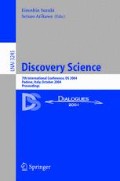Abstract
Constructive Inductive Learning, CIL, aims at learning more accurate or comprehensive concept descriptions by generating new features from the basic features initially given. Most of the existing CIL systems restrict the kinds of functions that can be applied to construct new features, because the search space of feature candidates can be very large. However, so far, no constraint has been applied to combining the basic features. This leads to generating many new but meaningless features. To avoid generating such meaningless features, in this paper, we introduce meta-attributes into CIL, which represent domain knowledge about basic features and allow to eliminate meaningless features. We also propose a Constructive Inductive learning system using Meta-Attributes, CIMA, and experimentally show it can significantly reduce the number of feature candidates.
Access this chapter
Tax calculation will be finalised at checkout
Purchases are for personal use only
Preview
Unable to display preview. Download preview PDF.
References
Bensusan, H., Kuscu, I.: Constructive Induction using Genetic Programming. In: Proceedings of the ICML 1996 Workshop on Evolutionary computing and Machine Learning (1996)
Blake, C.L., Merz, C.J.: UCI Repository of machine learning databases, Irvine, CA: University of California, Department of Information and Computer Science (1998), http://www.ics.uci.edu/~mlearn/MLRepository.html
Hastie, T., Tibshirani, R., Friedman, J.: The Elements of Statistical Learning. Springer, Heidelberg (2001)
Hu, Y., Kibler, D.: Generation of Attributes for Learning Algorithms. In: Proc.of AAAI 1996, pp. 806–811 (1996)
Kramer, S., Lavrač, N., Flach, P.: Propositionalization Approaches to Relational Data Mining. In: Džeroski, S., Lavrač, N. (eds.) Relational Data Mining, pp. 262–291. Springer, Heidelberg (2001)
Krawiec, K.: Constructive Induction in Learning of Image Representation, Institute of Computing Science Poznan University of Technology Research Report RA- 006/2000 (2000)
Markovitch, R., Rosenstein, D.: Feature Generation Using General Constructor Functions. Machine Learning 49, 59–98 (2002)
Michalski, R.: Pattern Recognition as Knowledge-Guided Computer Induction, Department of Computer Science, University of Illinois, Urbana, Report No.927 (1978)
Michalski, R.: A Theory and Methodology of Inductive Learning. Artificial Intelligence 20(2), 111–161 (1983)
Muggleton, S.: Inverse Entailment and Progol. New Generation Computing 13, 245–286 (1995)
Quinlan, J.: C4.5: Programs for Machine Learning. Morgan Kaufmann, San Mateo (1992)
Quinlan, J., Camereon-Jones, R.M.: Induction of Logic Programs:FOIL and Related Systems. New Generation Computing 13, 287–312 (1995)
Author information
Authors and Affiliations
Editor information
Editors and Affiliations
Rights and permissions
Copyright information
© 2004 Springer-Verlag Berlin Heidelberg
About this paper
Cite this paper
Ohara, K., Onishi, Y., Babaguchi, N., Motoda, H. (2004). Constructive Inductive Learning Based on Meta-attributes. In: Suzuki, E., Arikawa, S. (eds) Discovery Science. DS 2004. Lecture Notes in Computer Science(), vol 3245. Springer, Berlin, Heidelberg. https://doi.org/10.1007/978-3-540-30214-8_11
Download citation
DOI: https://doi.org/10.1007/978-3-540-30214-8_11
Publisher Name: Springer, Berlin, Heidelberg
Print ISBN: 978-3-540-23357-2
Online ISBN: 978-3-540-30214-8
eBook Packages: Springer Book Archive

